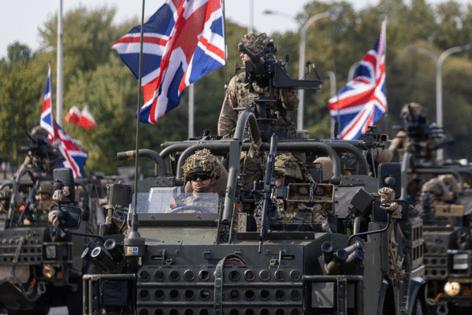UK vows to spend 5% of GDP on security by 2035 to hit NATO goal
Published in News & Features
LONDON — U.K. Prime Minister Keir Starmer will vow to spend 5% of British economic output on security by 2035, embracing an ambitious NATO target sought by President Donald Trump without providing a path on how to get there.
After weeks of refusing to be drawn on the matter, the premier will make the new commitment on Tuesday at the North Atlantic Treaty Organization’s summit in The Hague, The Netherlands, according to a statement from his office. There, leaders are due to adopt the alliance’s new 5% goal, up from 2% currently, which includes 3.5% to be spent on core defense and 1.5% on related security expenditure.
“We must navigate this era of radical uncertainty with agility, speed and a clear-eyed sense of the national interest to deliver security for working people and keep them safe,” Starmer said in the statement. “This is an opportunity to deepen our commitment to NATO and drive greater investment in the nation’s wider security and resilience.”
The new promise marks a significant increase on the government’s current plans, to reach 2.6% — including intelligence spending — by 2027. But there was scant detail on how to hit 5% by 2035 — a year that comes after the next two general elections at least. Current government plans would keep core defense spending at the new level until the end of the Parliamentary term in 2029, leaving a sizable increase to be made over the ensuing six years.
When Starmer earlier this year said he was raising defense expenditure to 2.5% of GDP from about 2.3% last year, he presented it as “the biggest sustained increase in defense spending since the end of the Cold War.” With intelligence spending, the total increased to 2.6%. He first hinted at a further increase in an interview with Bloomberg earlier this month.
U.K. confronts hard reality of rebuilding its military prowess
Russia’s continued aggression in Ukraine, coupled with pressure from U.S. President Trump for the U.K. and its neighbors in Europe to shoulder more of the burden for their own defense has added more urgency to the European push to ramp up expenditure.
With more ambitious goals under discussion in recent weeks, Starmer was successful in persuading NATO secretary general Mark Rutte in pushing back the time-line to reach the target from 2032 to 2035. All allies, other than Spain, are expected to commit to the target at NATO’s summit in the Netherlands this week. Spanish Prime Minister Pedro Sanchez obtained an exemption after several days of lobbying.
Starmer’s office highlighted how broader expenditure on national security means the U.K. is closer to the fresh target than the numbers for raw military spending would suggest.
To reach the new NATO goal, the government will broaden its definition of security spending to encompass national resilience and homeland defense — including protecting the country’s borders, supply chains and critical infrastructure. Once those areas are factored in, the U.K. expects to be at 4.1% of gross domestic product on security in 2027, Starmer’s office office said. Even so, there are no plans currently in place to increase core military spending between 2027 and 2029 — though as part of the new commitment, the U.K. would aim to spend 3.5% on its military by 2035.
The U.K. isn’t alone in seeking to fudge the numbers: Spain has brokered an exemption from the new target after days of diplomatic wrangling, saying it can get defense spending up to 2.1%, “nothing more, nothing less.” Spain says the goal should be around capabilities rather than the amount spent, arguing it can reach the necessary military capacity on a lower spend.
Germany meanwhile announced on Monday that it would lift core defense spending to 3.5% over the next five years, well ahead of the NATO time-line. Crucially, NATO will review the trajectory of its spending target in 2029, after Trump is due to leave office. Europe is bracing for a further U.S. retreat from the region, with Trump’s administration due to present its military review following the summit.
Europe frets about U.S. retreating from region ahead of NATO
The U.K. will also unveil its National Security Strategy this week, alongside a long-awaited audit of its relationship with China and a new industrial strategy. The security strategy sets out how Britain must “become more competitive and robust in crucial areas” like science, education, trade and frontier technology, “or risk falling behind,” Starmer’s office said.
“We will become more unapologetic and systematic in pursuit of our national interests,” it said. That includes building more cutting the U.K.’s dependency on other nations for key goods and materials, and investing £86 billion ($116 billion) in research and development to bolster the growth of new technologies and enhance the protection of the country’s critical national infrastructure from cyber-attacks and sabotage.
_____
(With assistance from Alex Wickham.)
©2025 Bloomberg L.P. Visit bloomberg.com. Distributed by Tribune Content Agency, LLC.







Comments